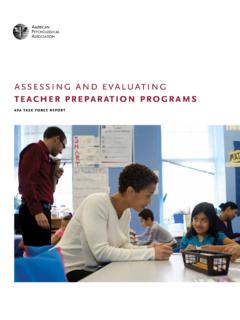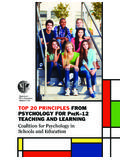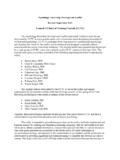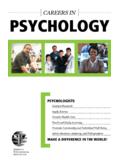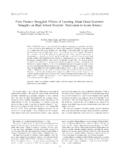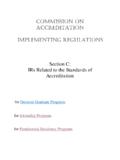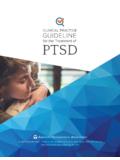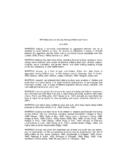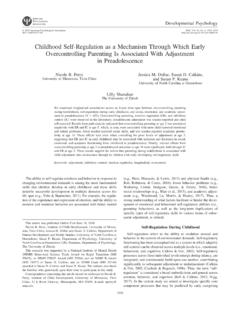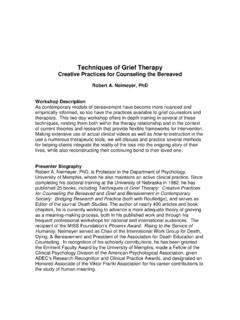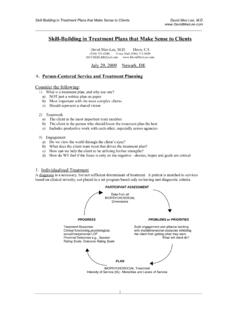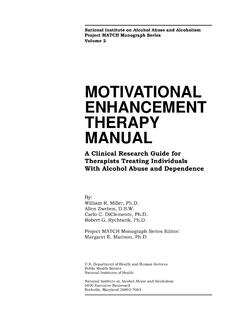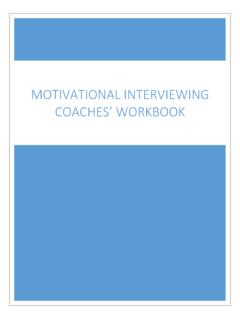Transcription of This historical document is derived from a 1990 APA ...
1 This historical document is derived from a 1990 APA presidential task force (revised in 1997). LEARNER-CENTERED PSYCHOLOGICAL PRINCIPLES: A Framework for School Reform & Redesign TABLE OF CONTENTS: Background Learner-Centered Principles Prepared by the Learner-Centered Principles Work Group of the American Psychological Association's Board of Educational Affairs (BEA), November 1997 BACKGROUND Throughout its history, psychology has provided vital information for the design of schooling based on theory and research on human learning, development, and motivation.
2 Research in psychology relevant to education has been particularly informative during the past decade. Advances in our understanding of thinking, memory, and cognitive and motivational processes can contribute directly to improvements in teaching, learning, and the whole enterprise of schooling. At the same time, educators concerned with the growing problems of school dropout, low levels of academic achievement, and other indicators of school failure are arguing for more learner-centered models of schooling. Such models attend to the diversity among students, and use this diversity to enrich learning and to produce results within the context of current school reform.
3 The learner-centered psychological principles, which are consistent with more than a century of research on teaching and learning, are widely shared and implicitly recognized in many excellent programs found in today's schools. They also integrate research and practice in various areas of psychology, including developmental, educational, experimental, social, clinical, organizational, community, and school psychology. In addition, these principles reflect conventional and scientific wisdom. They comprise not only systematically researched and evolving learner-centered principles that can lead to effective schooling but also principles that can lead to positive mental health and productivity of our nation`s children, their teachers, and the systems that serve them.
4 Learner-centered psychological principles provide a framework for developing and incorporating the components of new designs for schooling. These principles emphasize the active and reflective nature of learning and learners. From this perspective, educational practice will be most likely to improve when the educational system is redesigned with the primary focus on the learner. Psychologists, in collaboration with educators, can help decide how best to apply sound psychological principles in the redesign of America's schools. A new and exciting vision of schooling, and psychology's role in this vision, can then emerge.
5 Our immediate goal in offering these learner-centered psychological principles is to provide a framework that can contribute to current educational reform and school redesign efforts. Through dialogue with concerned groups of educators, researchers, and policy makers, these learner-centered principles can evolve further to contribute not only to a new design for America's schools, but also to a society committed to lifelong learning, healthy human development, and productivity. In developing these principles, psychology -- together with other disciplines -- can contribute to the betterment of America's schools and the enhancement of the nation's vital human resources.
6 This historical document is derived from a 1990 APA presidential task force (revised in 1997). LEARNER-CENTERED PSYCHOLOGICAL PRINCIPLES The following 14 psychological principles pertain to the learner and the learning process*. They focus on psychological factors that are primarily internal to and under the control of the learner rather than conditioned habits or physiological factors. However, the principles also attempt to acknowledge external environment or contextual factors that interact with these internal factors. The principles are intended to deal holistically with learners in the context of real-world learning situations.
7 Thus, they are best understood as an organized set of principles; no principle should be viewed in isolation. The 14 principles are divided into those referring to cognitive and metacognitive, motivational and affective, developmental and social, and individual difference factors influencing learners and learning. Finally, the principles are intended to apply to all learners -- from children, to teachers, to administrators, to parents, and to community members involved in our educational system. Cognitive and Metacognitive Factors 1. Nature of the learning process.
8 The learning of complex subject matter is most effective when it is an intentional process of constructing meaning from information and experience. There are different types of learning processes, for example, habit formation in motor learning; and learning that involves the generation of knowledge, or cognitive skills and learning strategies. Learning in schools emphasizes the use of intentional processes that students can use to construct meaning from information, experiences, and their own thoughts and beliefs. Successful learners are active, goal-directed, self-regulating, and assume personal responsibility for contributing to their own learning.
9 The principles set forth in this document focus on this type of learning. 2. Goals of the learning process. The successful learner, over time and with support and instructional guidance, can create meaningful, coherent representations of knowledge. The strategic nature of learning requires students to be goal directed. To construct useful representations of knowledge and to acquire the thinking and learning strategies necessary for continued learning success across the life span, students must generate and pursue personally relevant goals. Initially, students' short-term goals and learning may be sketchy in an area, but over time their understanding can be refined by filling gaps, resolving inconsistencies, and deepening their understanding of the subject matter so that they can reach longer-term goals.
10 Educators can assist learners in creating meaningful learning goals that are consistent with both personal and educational aspirations and interests. 3. Construction of knowledge. The successful learner can link new information with existing knowledge in meaningful ways. Knowledge widens and deepens as students continue to build links between new information and experiences and their existing knowledge base. The nature of these links can take a variety of forms, such as adding to, modifying, or reorganizing existing knowledge or skills. How these links are made or develop may vary in different subject areas, and among students with varying talents, interests, and abilities.
